Clive Staples Lewis was a British writer, literary scholar, and Anglican lay theologian. He held academic positions in English literature at both Magdalen College, Oxford (1925–1954), and Magdalene College, Cambridge (1954–1963). He is best known as the author of The Chronicles of Narnia, but he is also noted for his other works of fiction, such as The Screwtape Letters and The Space Trilogy, and for his non-fiction Christian apologetics, including Mere Christianity, Miracles, and The Problem of Pain.

The Inklings were an informal literary discussion group associated with J. R. R. Tolkien and C. S. Lewis at the University of Oxford for nearly two decades between the early 1930s and late 1949. The Inklings were literary enthusiasts who praised the value of narrative in fiction and encouraged the writing of fantasy. The best-known, apart from Tolkien and Lewis, were Charles Williams, and Owen Barfield.
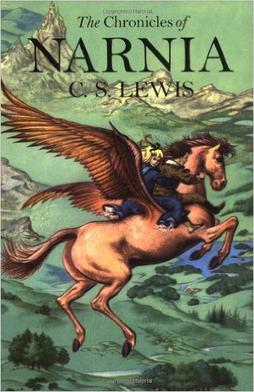
The Chronicles of Narnia is a series of seven portal fantasy novels by British author C. S. Lewis. Illustrated by Pauline Baynes and originally published between 1950 and 1956, the series is set in the fictional realm of Narnia, a fantasy world of magic, mythical beasts and talking animals. It narrates the adventures of various children who play central roles in the unfolding history of the Narnian world. Except in The Horse and His Boy, the protagonists are all children from the real world who are magically transported to Narnia, where they are sometimes called upon by the lion Aslan to protect Narnia from evil. The books span the entire history of Narnia, from its creation in The Magician's Nephew to its eventual destruction in The Last Battle.
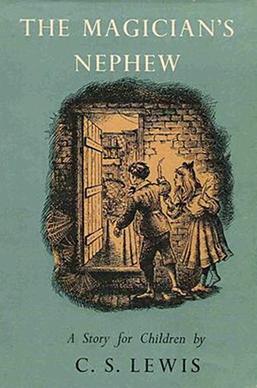
The Magician's Nephew is a portal fantasy children's novel by C. S. Lewis, published in 1955 by The Bodley Head. It is the sixth published of seven novels in The Chronicles of Narnia (1950–1956). In recent editions, which sequence the books according in chronological order, it is placed as the first volume of the series. Like the others, it was illustrated by Pauline Baynes whose work has been retained in many later editions. The Bodley Head was a new publisher for The Chronicles, a change from Geoffrey Bles who had published the previous five novels.
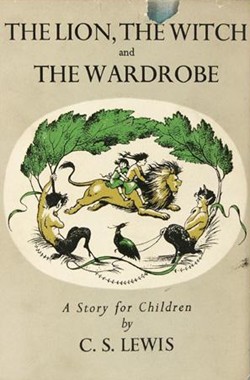
The Lion, the Witch and the Wardrobe is a portal fantasy novel for children by C. S. Lewis, published by Geoffrey Bles in 1950. It is the first published and best known of seven novels in The Chronicles of Narnia (1950–1956). Among all the author's books, it is also the most widely held in libraries. It was the first of The Chronicles of Narnia to be written and published, but is marked as volume two in recent editions that are sequenced according the stories' internal chronology. Like the other Chronicles, it was illustrated by Pauline Baynes, and her work has been retained in many later editions.
Warren Hamilton Lewis was an Irish historian and officer in the British Army, best known as the elder brother of writer and professor C. S. Lewis. Warren Lewis was a supply officer with the Royal Army Service Corps of the British Army during and after the First World War. After retiring in 1932 to live with his brother in Oxford, he was one of the founding members of the Inklings, an informal Oxford literary society. He wrote on French history, and served as his brother's secretary for the later years of C. S. Lewis's life.
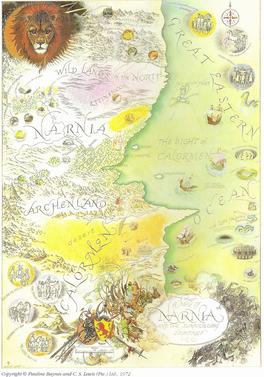
Narnia is a fantasy world created by C. S. Lewis as the primary location for his series of seven fantasy novels for children, The Chronicles of Narnia. The world is named after the country of Narnia, where much of the Chronicles takes place.

Wheaton College is a private Evangelical Christian liberal arts college in Wheaton, Illinois, United States. It was founded by evangelical abolitionists in 1860. Wheaton College was a stop on the Underground Railroad and graduated one of Illinois' first black college graduates.
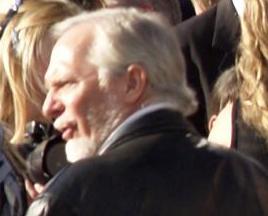
Douglas Howard Gresham is an American British stage and voice-over actor, biographer, film producer, and executive record producer. He is one of the two stepsons of C. S. Lewis.

Pauline Diana Baynes was an English illustrator, author, and commercial artist. She contributed drawings and paintings to more than 200 books, mostly in the children's genre. She was the first illustrator of some of J. R. R. Tolkien's minor works, including Farmer Giles of Ham, Smith of Wootton Major, and The Adventures of Tom Bombadil. She became well-known for her cover illustrations for The Hobbit and The Lord of the Rings, and for her poster map with inset illustrations, A Map of Middle-earth. She illustrated all seven volumes of C. S. Lewis's Chronicles of Narnia, from the first book, The Lion, the Witch and the Wardrobe. Gaining a reputation as the "Narnia artist", she illustratred spinoffs like Brian Sibley's The Land of Narnia. In addition to work for other authors, including illustrating Roger Lancelyn Green's The Tales of Troy and Iona and Peter Opie's books of nursery rhymes, Baynes created some 600 illustrations for Grant Uden's A Dictionary of Chivalry, for which she won the Kate Greenaway Medal. Late in her life she began to write and illustrate her own books, with animal or Biblical themes.
Charles Leslie WrennFPCO (1895–1969) was an English scholar and writer, the Rawlinson and Bosworth Professor of Anglo-Saxon between 1945 and 1963, and the founder and chairman of the International Association of University Professors of English. Wrenn was also the President of the Philological Society from 1944 to 1948.
Walter McGehee Hooper was an American writer. He is best known as the editor of many posthumous books by C. S. Lewis, as the joint author of a biography of Lewis and as the literary advisor of Lewis's estate. He was also a literary trustee for Lewis's friend Owen Barfield from December 1997 until October 2006.
Michael D. C. Drout is an American Professor of English and Director of the Center for the Study of the Medieval at Wheaton College. He is an author and editor specializing in Anglo-Saxon and medieval literature, science fiction and fantasy, especially the works of J. R. R. Tolkien and Ursula K. Le Guin.
Colin Duriez is an English writer on fantasy, especially that of the Inklings literary group centred around the Christian authors C. S. Lewis and J. R. R. Tolkien.

Diana Pavlac Glyer is an American author, speaker and teacher whose work centers on C. S. Lewis, J. R. R. Tolkien and the Inklings. She teaches in the Honors College at Azusa Pacific University in California.
Joel D. Heck is a retired pastor and professor, formerly Executive Editor of Concordia University Press. He is the author or editor of sixteen books, most recently publishing No Ordinary People: Twenty-One Friendships of C. S. Lewis. He currently serves as Interim President of Concordia Lutheran Seminary in Edmonton, Alberta, Canada.

Dorothy Leigh Sayers was an English crime novelist, playwright, translator and critic.
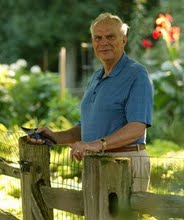
Rolland Hein was an American academic of English literature. He was professor emeritus of English at Wheaton College, Wheaton, Illinois.
Clyde Samuel Kilby was an American writer and English professor, best known for his scholarship on the Inklings, especially J. R. R. Tolkien and C. S. Lewis. A professor at Wheaton College (Illinois) for most of his life, Kilby founded the Marion E. Wade Center there, making it a center for the study of the Inklings, their friends, and their influences.
The Chronicles of Narnia is a series of seven fantasy novels for children written by C. S. Lewis. It is considered a classic of children's literature and is the author's best-known work, having sold over 100 million copies in 47 languages. The series borrows characters and ideas from Classical, Norse, Irish, Arthurian, Islamic, Jewish and Christian mythology. Of all the mythologies taken into consideration, the Christian one is the most fundamental for the Narnia series, due to the themes covered.